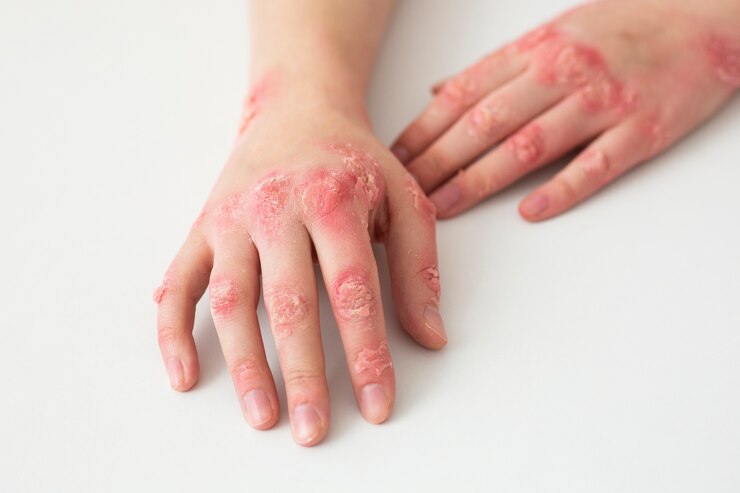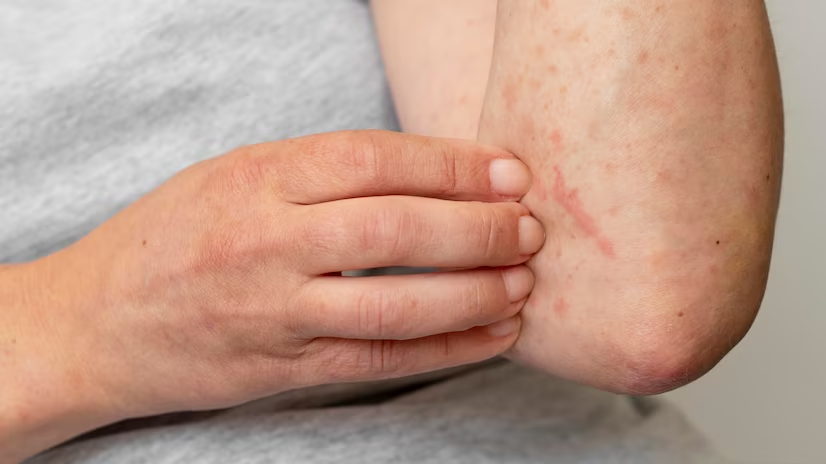
When it comes to skin concerns, two conditions that often prompt confusion and uncertainty are eczema and dry skin. The terms "eczema" and "dry skin" are commonly used interchangeably, leading many to believe they refer to the same issue. However, it is crucial to recognize the difference between eczema and dry skin to ensure appropriate care and treatment.
In this comprehensive blog post, we will dive into the world of eczema vs dry skin, examining their unique characteristics, underlying causes, and distinct symptoms. By unraveling the complexities surrounding these conditions, we aim to provide you with a clear understanding of how eczema and dry skin differ from one another. Armed with this knowledge, you will be better equipped to tackle your skin concerns and nurture your skin's health effectively.
What is Eczema?

Eczema, also known as atopic dermatitis, is a chronic inflammatory skin condition that affects millions of people worldwide. It is characterized by patches of dry, itchy, and inflamed skin. Eczema can vary in severity, ranging from mild cases with occasional flare-ups to severe and persistent symptoms.
Eczema has various types, including contact dermatitis, nummular eczema, seborrheic dermatitis, dyshidrotic eczema, and stasis dermatitis, each with distinct characteristics and triggers.
Comparing Eczema and Dry Skin

When comparing eczema vs dry skin, it is important to understand their similarities and differences to ensure proper diagnosis and treatment. Eczema and dry skin share some common symptoms, such as dryness and itching, but they have different underlying causes and require distinct approaches to management.
Dry skin or xerosis, is a common condition characterized by a lack of moisture in the skin. It occurs when the skin's natural lipid barrier is compromised, leading to increased water loss. Dry skin is often caused by external factors such as harsh weather conditions, low humidity, excessive bathing, or the use of harsh soaps and detergents. It can also be influenced by internal factors like aging, certain medical conditions, or genetic predisposition. The primary symptoms of dry skin include roughness, flakiness, and a tight, uncomfortable sensation.
On the other hand, eczema or atopic dermatitis, is a chronic inflammatory skin condition that results from a combination of genetic and environmental factors. It involves a compromised skin barrier, dysfunctional immune response, and heightened skin sensitivity. Eczema is often associated with a family history of allergies, asthma, or eczema itself. The symptoms of eczema include intense itching, redness, inflammation, and the appearance of dry, scaly patches, which can sometimes become oozing and prone to infections.
While both conditions involve dry skin, eczema is characterized by additional symptoms such as intense itching and inflammation. Eczema tends to have a more chronic nature, with flare-ups occurring periodically and varying in severity. The affected areas in eczema are often more localized and specific, such as the flexural surfaces of joints (inside elbows or behind knees), face, hands, or feet.
Understanding the difference between eczema and dry skin is crucial in determining the appropriate treatment and management strategies. If you are experiencing persistent or severe symptoms, it is recommended to consult with a healthcare professional for an accurate diagnosis and personalized treatment plan that addresses your specific condition, whether it is eczema or dry skin.
Symptoms of Eczema and Dry Skin
Symptoms of eczema can vary in severity and presentation. Common symptoms include:
Itchiness
: One of the hallmark symptoms of eczema is intense itching, which can be persistent and lead to scratching, further exacerbating the condition.Dry, sensitive skin
: Eczema-prone skin tends to be dry, lacking moisture, and more sensitive than normal skin. This can make the skin feel tight and uncomfortable.Scaly skin in patches
: Eczema can cause the skin to become rough, thickened, and develop a leathery texture. Scaly or flaky patches may also be present.Oozing or crusting
: In severe cases, eczema may lead to oozing or crusting of the affected skin. This can occur due to excessive scratching, which damages the skin's protective barrier.Inflamed, discolored skin
: Eczema often causes redness and inflammation of the affected areas. The skin may appear reddish or pinkish due to increased blood flow and inflammation.Swollen areas
: Eczema can cause localized swelling, particularly during flare-ups. Swollen areas may appear puffy or raised.Dry skin shows different symptoms, can cause a person's skin to exhibit various symptoms, including:
Dehydration
: Dry skin lacks proper hydration, resulting in a dull and parched appearance.Flaking or rough texture
: The skin may develop flakes or patches of rough texture, especially in areas prone to dryness such as the elbows, knees, or hands.Skin fissures or cracks
: In severe cases, dry skin can lead to cracks or fissures, particularly in areas that are exposed to frequent movement or excessive dryness.Itchiness
: Dry skin often causes itching, which can be mild to severe and may lead to scratching that further aggravates the condition.Stinging or burning sensation
: Dry skin can be sensitive and may experience stinging or burning sensations, especially when exposed to certain irritants or harsh skincare products.Development of wrinkles
: Prolonged dryness can contribute to the development of fine lines, wrinkles, and a general sense of looseness or sagging of the skin. Shedding: Dry skin may undergo a process of peeling, where layers of dead or dry skin cells shed off.Irritated
: Dry skin can become raw, red, or irritated, especially when exposed to friction, excessive dryness, or harsh environmental factors.By recognizing the specific symptoms of eczema or dry skin, individuals can better understand their condition and seek appropriate treatment and management strategies to address their specific needs.
Treatment and Management of Eczema vs. Dry Skin

The treatment and management approaches for eczema vs dry skin differ due to their distinct causes and symptoms. Here are some strategies for addressing each condition:
Eczema
Moisturization
: Regular and thorough moisturization is essential for managing eczema. Use moisturizers specifically formulated for sensitive or eczema-prone skin. Apply them generously to retain moisture and help restore the skin barrier.Avoid Triggers
: Identify and avoid triggers that worsen eczema symptoms. These can include certain allergens, irritants, or environmental factors like extreme temperatures or dry air. Keeping a diary can help track potential triggers.Gentle Cleansing
: Use mild, fragrance-free cleansers or soap substitutes when bathing. Avoid hot water and excessive scrubbing, as these can strip away natural oils and further dry out the skin.Topical Steroids or Immunomodulators
: For moderate to severe eczema flare-ups, topical corticosteroids or immunomodulators may be prescribed by a healthcare professional. These medications help reduce inflammation and alleviate symptoms.Antihistamines
: Oral antihistamines can provide relief from itching, particularly during nighttime when eczema symptoms can disrupt sleep.Wet Wrap Therapy
: In some cases, wet wrap therapy may be recommended. It involves applying moisturizers and medications to the affected areas and then wrapping them with wet bandages or clothing to enhance absorption and soothe the skin.Dry Skin
Moisturization: Regularly moisturize the skin using emollients or moisturizers that contain humectants to attract and retain moisture. Apply them after bathing or whenever the skin feels dry.
Avoid Harsh Products
: Use gentle, fragrance-free cleansers and avoid harsh soaps or detergents that can further dry out the skin. Opt for products specifically formulated for dry or sensitive skin.Shorter Showers and Lukewarm Water
: Limit shower or bath time and use lukewarm water instead of hot water, as hot water can strip the skin's natural oils and exacerbate dryness.Humidifier
: Use a humidifier in dry environments to 5radd moisture to the air, particularly during the winter months when indoor heating can contribute to dry skin.Protect from Harsh Conditions
: Protect the skin from harsh weather conditions, such as cold winds or dry air, by wearing appropriate clothing, including gloves and scarves.Hydrating Masks or Treatments
: Consider using hydrating masks or treatments specifically designed for dry skin to provide an extra boost of moisture.Can dry skin increase the risk of developing eczema?
While dry skin itself does not cause eczema, it can trigger or exacerbate symptom flares in individuals who already have eczema.
Dry skin lacks proper moisture and hydration, which can compromise the skin's natural barrier function. When the skin barrier is weakened, it becomes more susceptible to external irritants, allergens, and microbial invasion. This can trigger an inflammatory response in individuals with a genetic predisposition to eczema, leading to the development of the condition.
When To Seek Medical Help

Knowing when to seek medical advice for eczema or dry skin is important. While it can often be managed with moisturizers and home remedies, there are situations where it's necessary to consult your doctor. Consider reaching out to your doctor if:
Symptoms Persist or Worsen
: If your dry skin symptoms do not improve with the treatments you've tried or if they worsen over time, it is advisable to seek medical attention. Your doctor can assess your condition and recommend appropriate interventions.Severe Itching Impacting Quality of Life
: If the itching associated with your dry skin becomes intense and significantly affects your daily life or prevents you from getting adequate sleep, it's a good idea to discuss this with your doctor. They can help identify the underlying cause and provide relief measures.Open Cuts or Sores from Scratching:
If persistent scratching leads to open cuts, sores, or signs of infection on your skin, it's important to consult your doctor. They can evaluate the severity of the situation and provide appropriate wound care or medications to prevent complications.Conclusion
Recognizing the difference between eczema and dry skin is crucial for accurate diagnosis and appropriate treatment. Eczema management focuses on moisturization, trigger avoidance, and sometimes the use of topical medications. Treatment for dry skin primarily involves regular moisturization, gentle skincare practices, and protection from environmental factors.
Understanding these distinctions enables you to seek appropriate medical advice, implement targeted skincare routines, and make informed decisions about your heir skin health.









